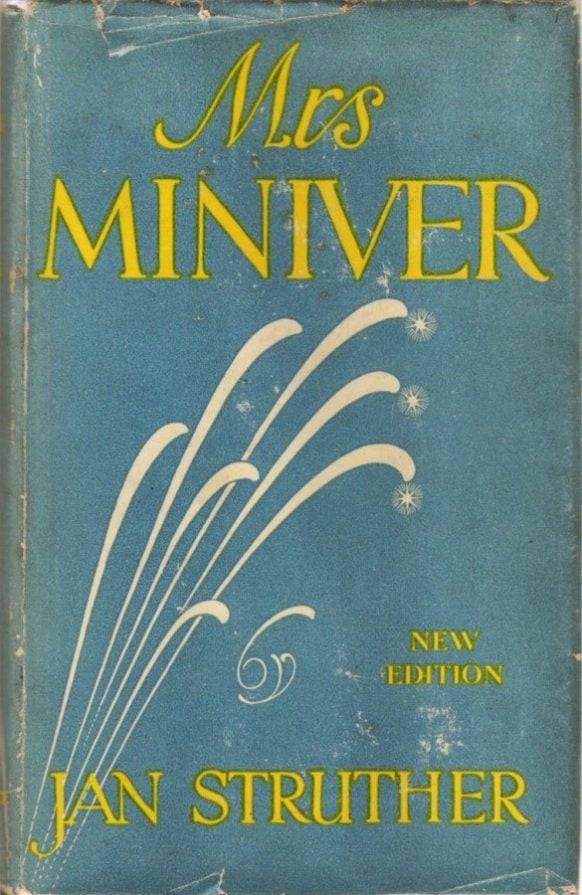Mrs. Miniver by Jan Struther
Perhaps it’s cheating to review such a classic as Jan Struther’s Mrs. Miniver, whose inspirational main character was immortalised by the great actress Greer Garson in the 1942 film Mrs. Miniver that won multiple academy awards including best actress and best picture. But our library has chosen not to shelve the novel — if the slight volume can be called that — under “Classics,” and our records show only one SMSA member has borrowed this latest edition of Mrs. Miniver since we purchased it two years ago. Greer Garson, still alive in 1990, wrote the fresh introduction.
Mrs. Miniver is a sensitive and imaginative yet delightfully down‑to‑earth woman, with incredible insight. She’s warm and fun but no fool. If you want a short, light yet intelligent read where every page fills you with simple pleasure, this is it.
The book is set in England just before the outbreak of World War II, and comprises a series of small episodes or vignettes, each perfectly self-contained — in keeping with their origin as a successful column the author wrote regularly for The Times, appearing on the Court page opposite news about the royal family.
Each episode describes a little journey into the mind of middle‑class mother and housewife Mrs. Miniver, as she interacts musingly with the people around her: her husband and three children, her servants, relatives, shopkeepers, her hosts when she visits, and her guests when she entertains. Sometimes she would rather not entertain certain people (“How silly it was, this convention…that you must not invite one half of a married couple to dinner without the other”), or leave home to pay visits (“a feeling of leaden oppression always came over her during the last few miles of the approach”) — whereas her bemused husband “knew that her panic would disappear the moment she set foot in the house.” Mrs. Minerva is fragile yet she always overcomes.
During one such country house visit with her husband Clem, Mrs. Miniver finds herself reflecting on a universal dilemma, “the devastating intimacy of a happy marriage.” Yet she also ponders over the smallest detail. Watching her daughter play with her doll, “Mrs. Miniver wondered whether the modern unbreakable dolls, which lasted for years, were more, or less, precious to their owners than the old china ones, whose expectation of life had been a matter of months.” Little escapes Mrs. Miniver’s eye; she finds every object and event worth thought. Her mind shoots off on beguiling tangents over the new family car, buying Christmas presents, trying on gas-masks, or visiting the duck pond at Hampstead Heath.
Everyone loved cheerful Mrs. Miniver — well, almost everyone. Some of the English literati were highly critical, but in the shadow of war the book and the character took America by storm. When Mrs. Miniver topped the US bestseller list in September 1940, it edged out high quality new releases such as How Green Was My Valley and books by C.S. Forester and Thomas Mann.
Needing US support in the war against Germany, the British government dispatched the author to America as a goodwill ambassador, where she gave talks around the country. A script was prepared for MGM by James Hilton (author of Lost Horizon and Goodbye, Mr. Chips!), and the hugely popular movie Mrs. Miniver, released in 1942, proved influential in persuading America to back England in the war against Hitler. Nazi propaganda minister Josef Goebbels hated Mr. and Mrs. Miniver, but admired their immense propaganda value. President Roosevelt arranged for quotes from the movie to be scattered by plane across Europe in leaflet form.
Jan Struther was the pen-name of Joyce Anstruther, Joyce Maxtone Graham after marriage, who had three children in a situation not dissimilar to that of Mrs. Miniver. An intelligent and entertaining woman, she became for several years a regular panellist on Information Please, a popular American radio quiz show. Sadly she died at only 52 in 1953 of a brain tumour, after battling depression and breast cancer.
Joyce Anstruther’s achievements included hymn‑writing (though she was an atheist) and several books of poetry. She led a fascinating and exciting life which included her clandestine love affair with the young Viennese immigrant Adolf Placzek, resulting in her second marriage. I look forward immensely to reading the biography The Real Mrs. Minerva, which SMSA library also holds.
Meanwhile her 150-page publication Mrs. Miniver, whose light touch belies the important part it once played in the course of Western history, remains an all-time classic.
Mrs. Miniver by Jan Struther
Derek Hornsey
SMSA Library Staff


